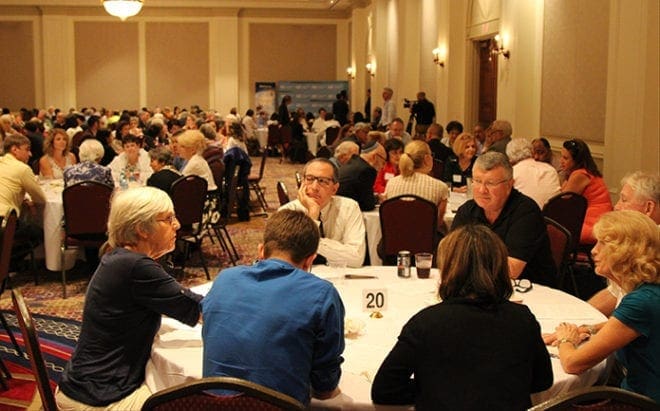 PHOTO BY DAVID PACE
PHOTO BY DAVID PACEAtlanta
‘Radical hospitality’ can help repair the world, speaker says
By ANDREW NELSON, Staff Writer | Published September 22, 2016
ATLANTA—Faced with political mudslinging, online venom, and racial unrest in this country, an interfaith crowd of Jewish and Catholic faithful wrestled with how to heal divisions.
In a room of more than 200 people, the ministry of Pope Francis was offered as a guidepost. Speakers quoted his vision of a “culture of encounter” and respect for people with different points of view.
“Dialogue is born from an attitude of respect for the other person, from a conviction the other person has something good to say. It assumes there is room in the heart for another person’s point of view,” Rabbi Peter S. Berg said, paraphrasing the pope.

Speakers for the interfaith event were Professor Marie Friedmann Marquardt, left, a Catholic and scholar-in-residence at Emory University’s Candler School of Theology, and Professor Paul Wolpe, right, a Jewish bioethicist and director of Emory University’s Center for Ethics. Photo By David Pace
In his welcoming remarks, Archbishop Wilton D. Gregory said tolerance goes beyond enduring differences. “Reverence is a great spiritual value and it really is at the heart of tolerance, that we reverence the other as the other.”
The American Jewish Committee Atlanta and the Archdiocese of Atlanta co-hosted the evening titled “Repairing the World: Our Responsibility for Tolerance” on Thursday, Sept. 8, at The Temple, the oldest Jewish congregation in Atlanta.
The evening drawing together Jews and Catholics was built on the foundation laid more than 50 years ago by church leaders at Vatican Council II. The Catholic Church document “Nostra Aetate” reset the relationship between the church and other world religions, particularly with the Jewish community.
It is one year since the golden anniversary of the document, which brought together members of both faith communities in north and central Georgia for prayer events by individual parishes and synagogues and an evening of interfaith music, art and drama.
This interfaith program was planned for the one-year anniversary to continue the local contact between the two faiths.
In these fractious times, in the midst of a presidential political season and when news at times appears on social media faster than it can be absorbed, a conversation about tolerance focused on the goal of listening more than talking.
At the event, two Emory University scholars addressed the question of tolerance. Speakers for the evening were Professor Marie Friedmann Marquardt, scholar-in-residence at Emory University’s Candler School of Theology, and Professor Paul Wolpe, a bioethicist and director of Emory University’s Center for Ethics.
Pope Francis has said people live in “soap bubbles which, however lovely, are insubstantial and offer fleeting and empty illusions which result in indifference to others,” Marquardt said.
People claim it is tolerance, but this indifference creates space between people to avoid responsibility, she noted.
In contrast, Marquardt said, “robust tolerance” sees hospitality—translated in the New Testament from the Greek word for love of strangers—as fulfilling God’s command.
“Hospitality is radical. It is one of the most difficult and rewarding things that we as humans can undertake. When we open our homes, our places of worship, our communities to those who are different, when we invite the stranger to sit at our table and share our meal with us, we tell them our story and we listen carefully to theirs,” she said. “It is impossible when we do this for things to remain embedded in a culture of indifference.”

An interfaith crowd of more than 200 from the Jewish and Catholic communities attended the Sept. 8 evening of dialogue and discussion. Photo By David Pace
A member of St. Thomas More Church, Decatur, Marquardt was one of the founders of El Refugio, a free house of hospitality in south Georgia established so families visiting their relatives being held in the Fort Stewart immigration detention center could have a place to rest, eat and stay overnight.
Wolpe said people of faith can contribute to tough but necessary dialogue by setting the tone of conversation that makes it civil.
The conversations and politics in this country are being driven by fear, he said.
“You can hear it in their voice, you can see it in the exclamation points,” he said.
He told a story of when an author of a contentious play spoke with his students. The subject matter was charged, so organizers were prepared for the worst. But the playwright respected opposing views and was soft-spoken, and as a result he made the discussion fruitful and revealing, Wolpe said.
“It’s only when we show compassion for another person’s point of view that we change the nature of that interaction,” he said.
On social media, Wolpe said, conversations deteriorate to the level of road rage. That is a part of the culture where users need to be taught respect and rules of engagement, he said, because it is where a lot of strife is revealed.
“There are no controls to social media. Really, listening is a lost art: 140 characters aren’t built to really listen. It isn’t that easy to cut through noise,” Wolpe said.
Later, the audience was split into small interfaith groups where Jews and Catholics shared their stories and discussed how to model tolerance in families and communities, teach children tolerance and speak up against intolerance.
Karen Colbert, of Temple Emanu-El, Dunwoody, said these conversations “help people to walk together along the same path.”
Angela Nieuwstadt, a parishioner of St. Lawrence Church, Lawrenceville, said the event reinforced her commitment to stand up for justice, a view shared by Marquardt. She said the discussion was uplifting in its message of compassion and hearing other’s stories. All the conversations came down to the golden rule—treat others as you’d like to be treated, she said. “Show compassion and understanding that God wants us to share.”